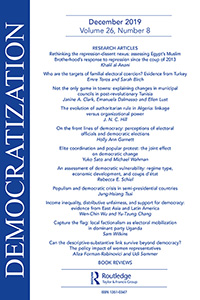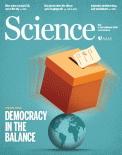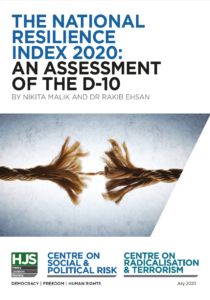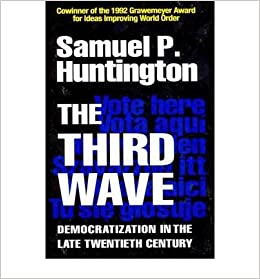
Credit: Democratization
The global democratic recession that began as a slow and quite uneven ebbing of progress fifteen years ago has now morphed into a substantial, comprehensive regression of freedom and democracy in the world – especially in those countries that matter most in the world because of their large size or geopolitical influence, according to a leading analyst.
The regression that has persisted – and deepened – over the past 14 years – is particularly visible among the G-20 countries and other most populous and geopolitically weighty countries, 19 of which have declined in freedom during the democratic recession, with only two improving, Stanford University’s Larry Diamond observes. The principal method of democratic regression has been incremental strangulation of democracy by elected (typically populist) executives who gradually eviscerate institutional checks, political opposition, independent media, and other forces of scrutiny and resistance in civil society, he writes for Democratization.
The experience of global democratic transformation at the end of the twentieth century is important to understanding the current era of democratic regression, for three reasons, adds Diamond, co-editor of the National Endowment for Democracy’s Journal of Democracy:
- First, it is important to appreciate that while political science may sometimes be successful in explaining the past, its record of predicting the future is chequered at best. No one in the mid-1970s or even the mid-1980s anticipated that by the mid-1990s a majority of the world’s states would be democratic – for the first time in the history of the world. Few people anticipated the imminence, scope, and speed of the collapse of the Soviet Union, or its stimulus to democratic change elsewhere in the world.
- Second, even a cursory acquaintance with regime dynamics in this period underscores the importance of international factors, including the global balance of power and the foreign policies of powerful states. The successful imposition of democracy by an external power is an exceedingly rare occurrence, and it is difficult to point to a single instance of it during the third wave. ….. Changes in American foreign policy – first with Jimmy Carter’s rhetorical emphasis and aid conditionality on human rights, then with the Reagan Administration’s crucially timed diplomatic interventions in the Philippines and South Korea – helped to tip the balance of power and expectations towards democratic actors in civil society and the political opposition.
- Third, democratization spread during the third wave to many countries that seemed to lack the supposed enabling conditions for it, such as high levels of per capita income and education, a substantial middle class and private sector, a reasonably capable state, cultural identification with liberal democratic values thought to be rooted in the Western enlightenment traditions, and a prior history of democratic government. …
 Are some countries better equipped from the onset of a democratization process to become consolidated democracies? Patrik Lindenfors, Matthew Wilson and Staffan I. Lindberg compared successful and failed episodes of liberalization over the period 1900 to 2018 to examine if starting state influences the probability of successful democratization. Liberalization in autocracies was more likely to succeed in countries that had the advantage of a better starting point concerning political institutions, GDP, and education, they write in Humanities and Social Sciences Communications.
Are some countries better equipped from the onset of a democratization process to become consolidated democracies? Patrik Lindenfors, Matthew Wilson and Staffan I. Lindberg compared successful and failed episodes of liberalization over the period 1900 to 2018 to examine if starting state influences the probability of successful democratization. Liberalization in autocracies was more likely to succeed in countries that had the advantage of a better starting point concerning political institutions, GDP, and education, they write in Humanities and Social Sciences Communications.
The “Matthew effect”—when advantage begets further advantage— is named from a parable of Jesus in the Gospel of Matthew (13:12 and 25:29; also in Mark 4:25; Luke 8:18 and 19:26), where Jesus states that “For unto every one that hath shall be given, and he shall have abundance: but from him that hath not shall be taken away even that which he hath”. The effect suggests that a high level of economic development does not make the beginning of a transition more likely but it is a strong determinant of successful transitions to democracy once begun, they conclude.
 Advances in technology are making it easier to distort true voter representation through gerrymandering, and political campaigns continue to struggle with reaching voters and persuading them to participate, according to a recent special issue of Science magazine. Worryingly, state violence, which has always been a core feature of the democratic experience for some, is spreading in democratic societies.
Advances in technology are making it easier to distort true voter representation through gerrymandering, and political campaigns continue to struggle with reaching voters and persuading them to participate, according to a recent special issue of Science magazine. Worryingly, state violence, which has always been a core feature of the democratic experience for some, is spreading in democratic societies.
Changing geopolitics mean not just a decline in Western support for democracy, but also probable increases in interference by Russia and China aimed at either undermining democracy or reducing the accountability of political elites to citizens, adds Susan D. Hyde of the Travers Department of Political Science, University of California, Berkeley. , citing research from the NED’s Journal of Democracy. Countries that have previously felt pressure to adopt democratic institutions will not be simply left to their own devices, free of any foreign interference.
 Resilience – the central theme of the European Union’s first annual Strategic Foresight Report – has become a new compass for EU policies with the COVID-19 crisis. It is the ability not only to withstand and to cope with challenges, but also to undergo transitions in a sustainable, equitable, and democratic manner.
Resilience – the central theme of the European Union’s first annual Strategic Foresight Report – has become a new compass for EU policies with the COVID-19 crisis. It is the ability not only to withstand and to cope with challenges, but also to undergo transitions in a sustainable, equitable, and democratic manner.
The first decade of the twenty-first century also saw the acceleration of four deep and interrelated social and economic trends with important implications for democracy, Diamond adds in Democratization:
- First was the rise of the internet, social media, and digital technology, which provided powerful tools for organizing mass, decentralized protests against dictatorship, but were less successful in facilitating the transformation of protest into organized, coordinated, politically led movements for democratic change. The failures of most Arab spring protests to secure lasting democratic reform, for example, owed in no small measure to this limitation…..
- Second was the shift from manufacturing to finance and technology/knowledge production as the dominant sources of wealth generation, which has been a major contributing factor to increasing income inequality, as a growing share of national income and wealth has been captured by the top one percent and especially the top tenth of one percent of income earners.
-

Larry Diamond
Third was the acceleration of globalization, with China joining the WTO in 2001 and rising levels of immigration into advanced economies. This displaced labour in the U.S. and some other advanced industrial economies, further aggravating social and economic insecurities and resentments.
- Fourth was the long-term impact of the neo-liberal revolution in economic policy, with its emphasis on deregulation and more scope for the free functioning of markets….Initially, the effect on democracy of the financial and economic crises that erupted in 2008 seemed to be defeats for incumbents rather than overthrow of democracies. However, the longer-term impact has been more damaging, giving rising to substantial anxiety and social conflict, and fertile soil for the rise of populist, nativist, anti-immigrant politics, with illiberal and even blatantly authoritarian undertones.
 We are perilously close to and indeed have probably already entered what Huntington would have called a “third reverse wave,” Diamond concludes. The global retreat of freedom is unlikely to be reversed any time soon unless the world’s wealthiest and most powerful democracies restore their own internal capacity and self-confidence, and renew their global commitment to supporting and defending democratic values. RTWT
We are perilously close to and indeed have probably already entered what Huntington would have called a “third reverse wave,” Diamond concludes. The global retreat of freedom is unlikely to be reversed any time soon unless the world’s wealthiest and most powerful democracies restore their own internal capacity and self-confidence, and renew their global commitment to supporting and defending democratic values. RTWT
And yet, if it’s not too Panglossian to suggest a silver lining to this cloud, recent events from Hong Kong and Thailand to Belarus and Malawi indicates continuing demand for democracy. In a survey conducted in the spring of 2020, 78% of respondents in 53 countries said that “democracy is important to have,” the Kofi Annan Foundation reports.
Democratic regression in comparative perspective: scope, methods, and causes https://t.co/tmyBSdpELU
— Democracy Digest (@demdigest) September 25, 2020







